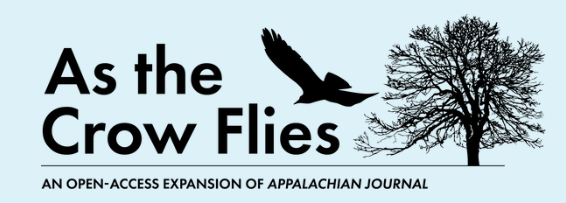As the Crow Flies, the new open-access expansion of Appalachian Journal: A Regional Studies Review, goes live Sept. 15. Appalachian Journal, founded in 1972, is an interdisciplinary, peer-reviewed quarterly featuring field research, roundtable discussions, interviews, first-person essays, and scholarly studies of history, politics, economics, culture, folklore, literature, music, ecology, and a variety of other topics, as well as poetry, photography, and reviews of books, films, and recordings dealing with the region of the Appalachian mountains. The material in As the Crow Flies undergoes the same editorial and peer review processes as the print content, but is more freely available to readers and researchers.
The inaugural issue of As the Crow Flies focuses on foodways, features scholarly material, book reviews of recent publications, and shorter informative pieces, including an essay honoring the Native food traditions of Appalachia’s eight federally and state-recognized Tribes. Highlights also include poetry from Tara Peck, William Rieppe Moore, Megan Krupa, Jesse Graves, Todd A. Comer, Pam Hunter McFarland, Jarrod Ingles, and Matthew Johnson, as well as creative nonfiction from Genevieve Bardwell, Kristen Pennycuff Trent, and Dr. Sarah Long.
Scholarly article, “Soup Beans in Appalachian Food Culture: Distinction, Representation and Resistance” by Lucy M. Long, analyzes the significance of soup beans as a food staple that is both stereotyped and embodies Appalachian identity. Long’s research provides an in-depth history of this food in the region, as well as its connections to both traditions and trends.
The issue includes writing from Jody DiPerna on cookies as a form of mutual aid in foundry towns, as well as an interview with physics instructor, Carla Ramsdell, exploring how she uses food and cooking as analogies in her Sustainable, Physics-Inspired Culinary Education (SPICE) Lab at Appalachian State University. René Locklear White (Lumbee) shares about the relationships between Indigenous languages, cultures, and foods of Appalachia’s Eight state- and federally-recognized Tribes as a method of decolonizing foodways.
In this issue, three creative nonfiction pieces all deal with food as a conduit for memory. In Dr. Sarah Long’s “What the Tongue Tastes, the Heart Remembers,” the author explores her hunger to know her birth mother and their shared connection through food. Genevieve Bardwell catalogs a woman’s memories of learning how to bake salt rising bread from a neighbor. Kristin Pennycuff Trent’s “Poor Man’s Syrup Cultivates a Rich Family Heritage” remembers making maple syrup in her childhood alongside family, a tradition which she has carried into the present day with the creation of hickory bark syrup.

Four reviews showcase recent literature on Appalachian foodways. Stephen Moxley reviews Southern Culture on the Fizz: An Effervescent Guide to Fermented Foods and Beverages from the American South by Brett Taubman. Amanda S. Green delves into Praisesong for the Kitchen Ghosts: Stories and Recipes from Five Generations of Black Country Cooks by Crystal Wilkinson. Morgan Robinson discusses Hungry Roots: How Food Communicates Appalachia’s Search for Resilience by Ashli Quesinberry Stokes and Wendy Atkins-Sayre. Finally, Mary Beth Crass explores The Modern Mountain Cookbook by Jan A. Brandenburg.
Readers can view the newest issue of As the Crow Flies at https://as-the-crow-flies.pubpub.org/
- submitted by Jessica Cory

